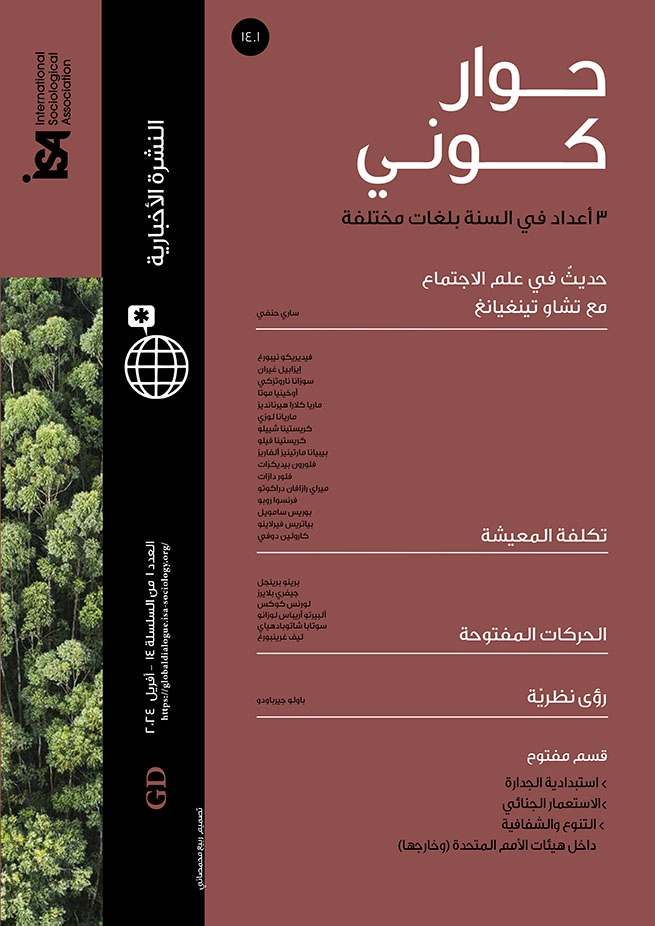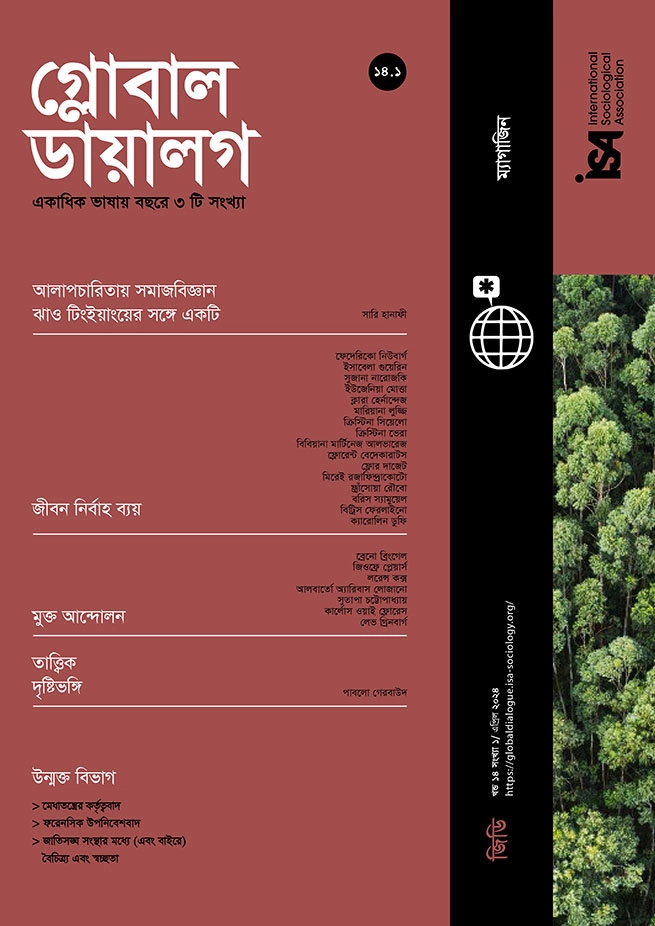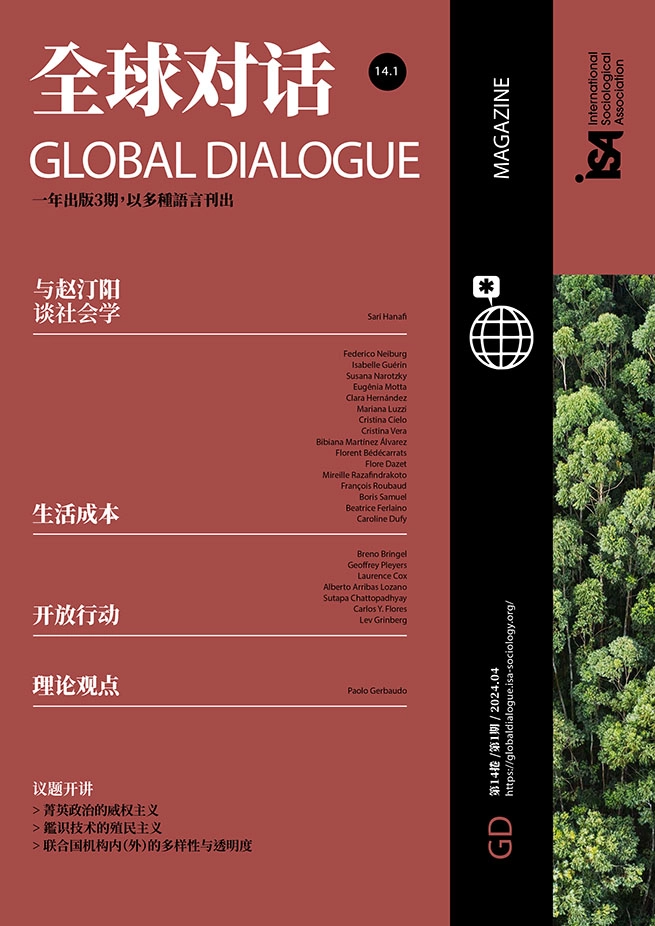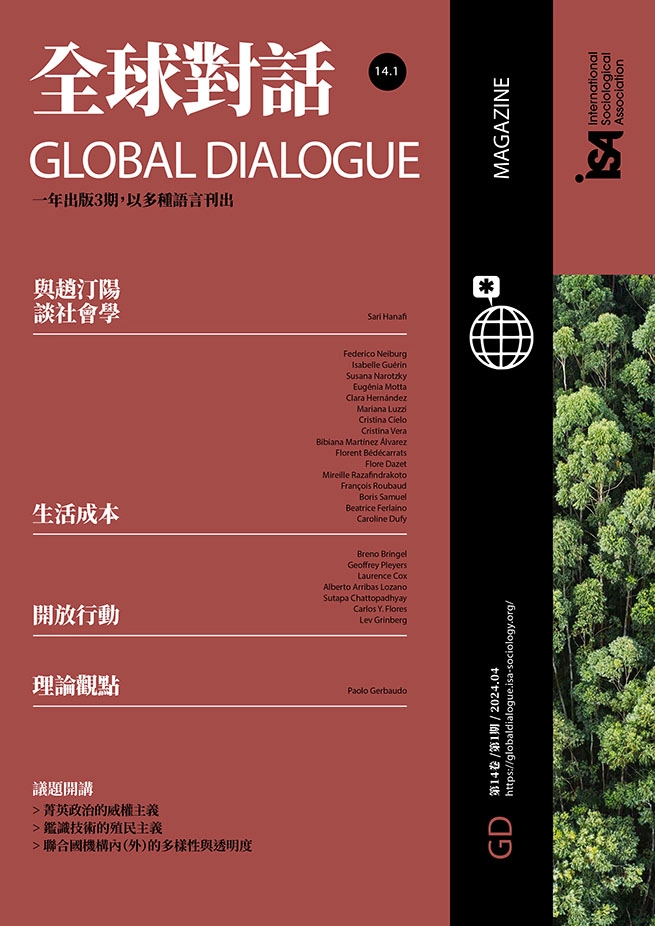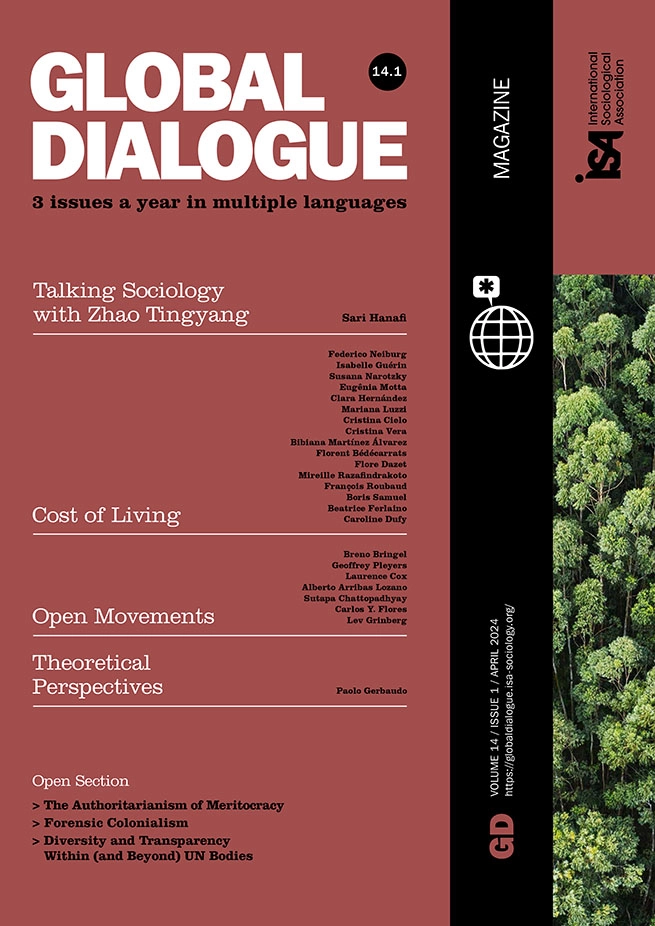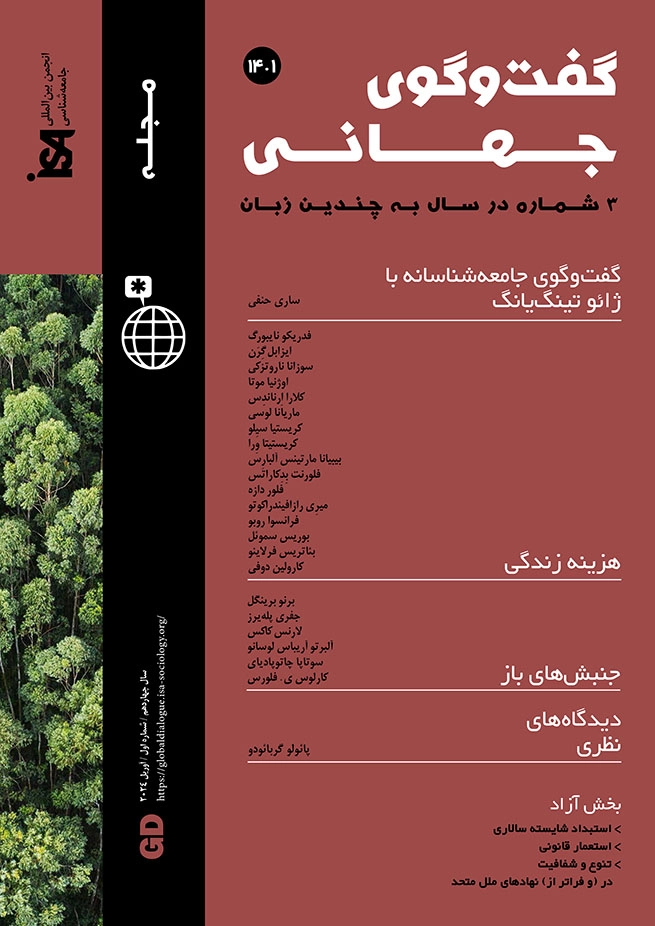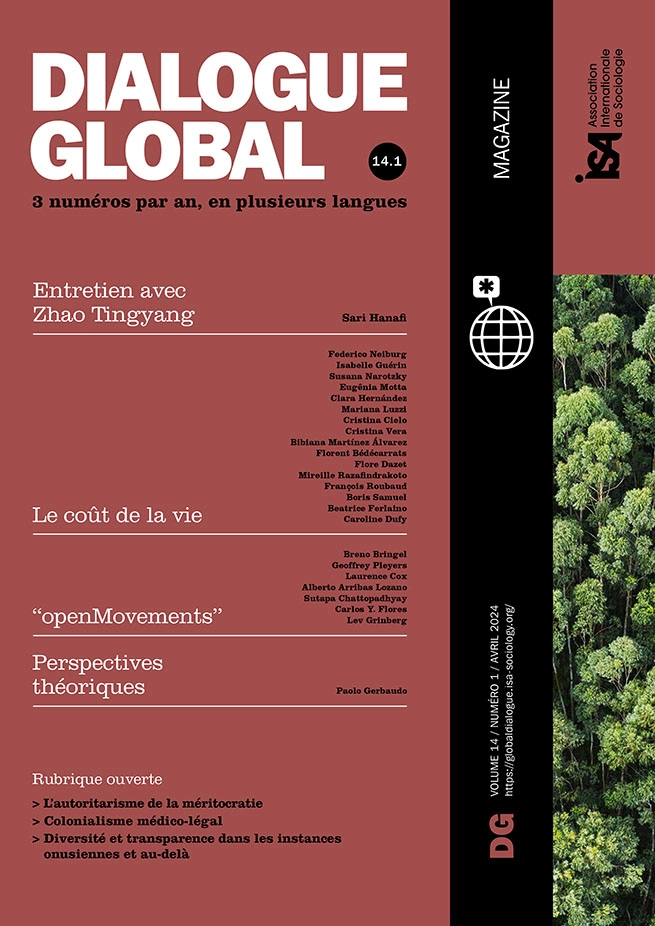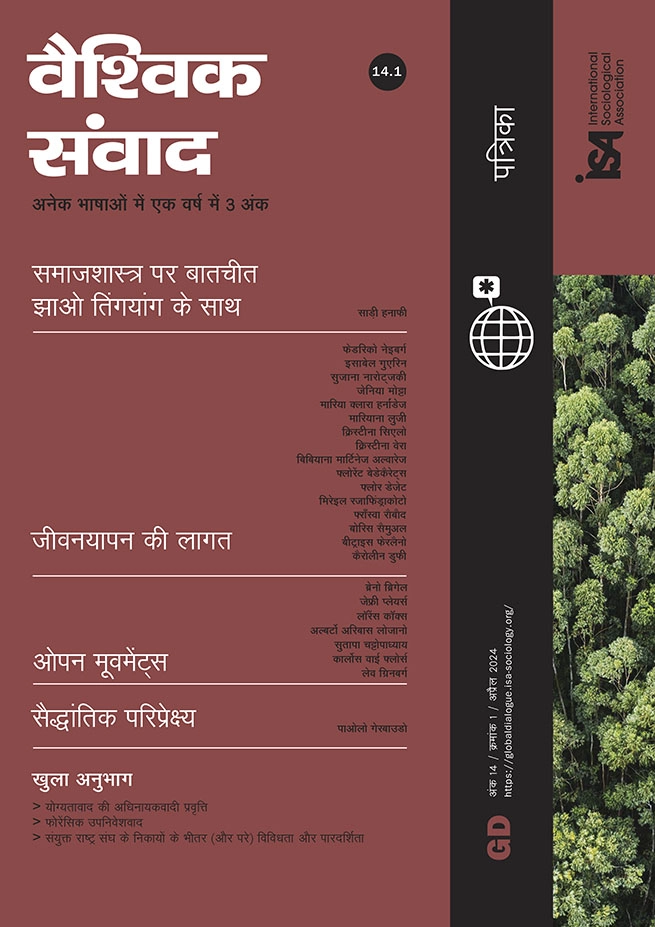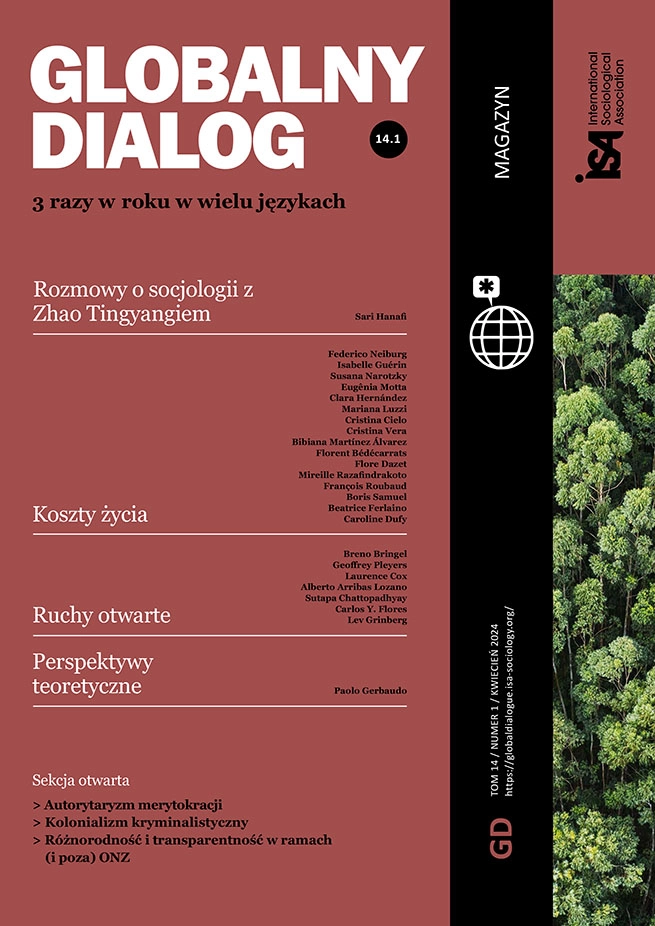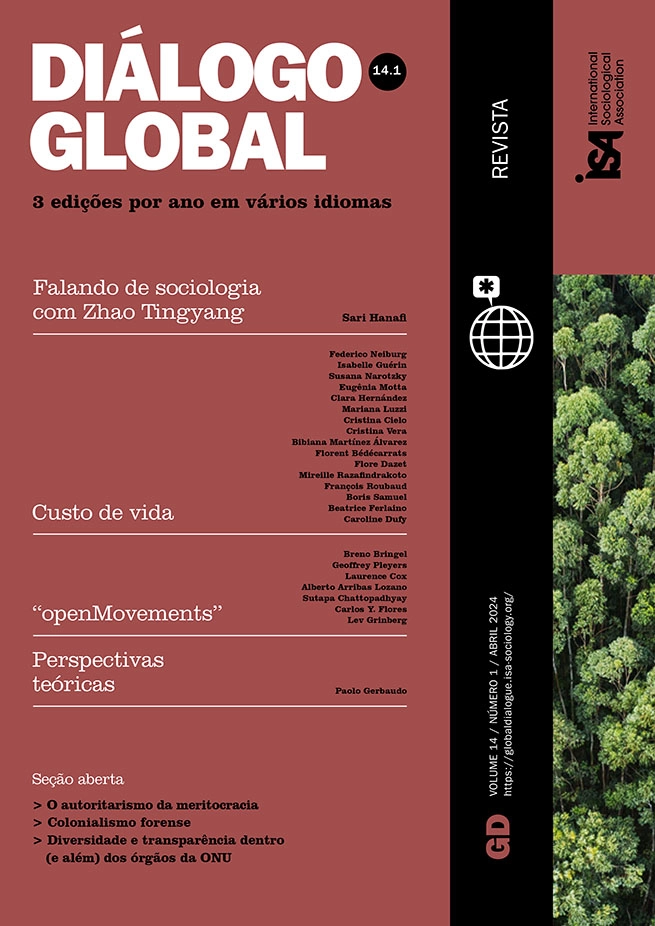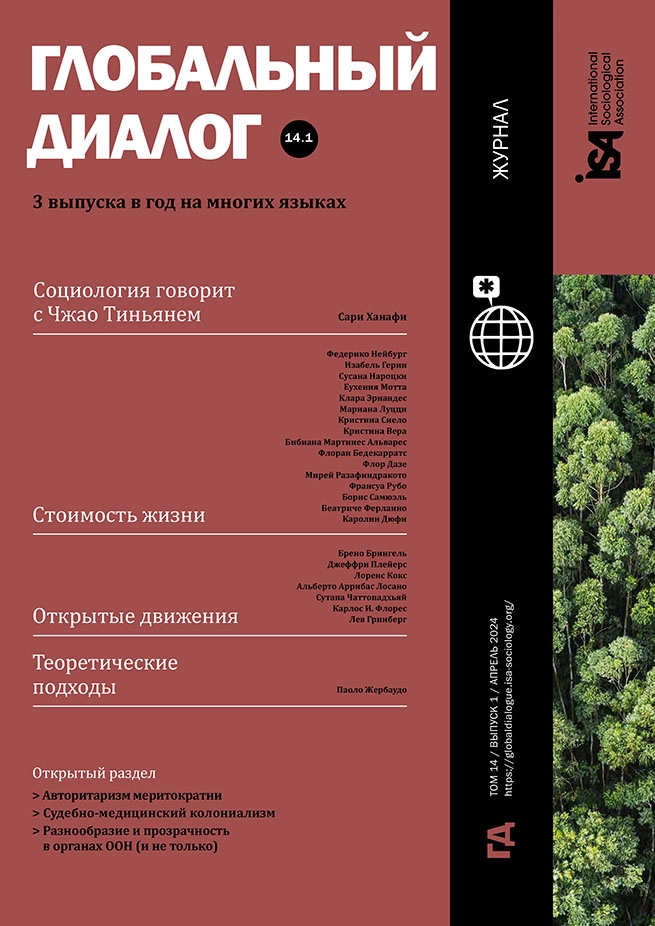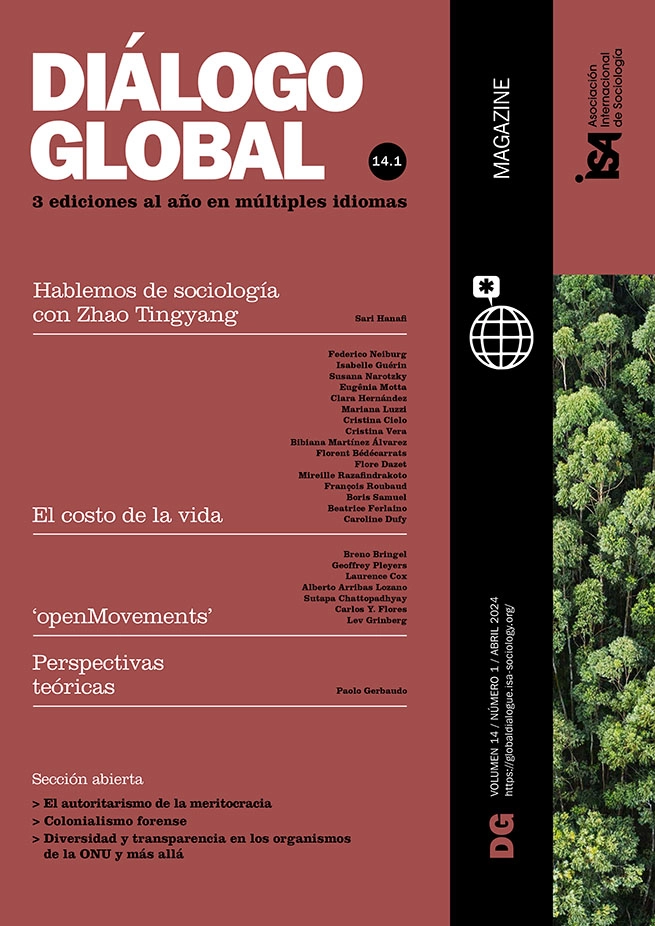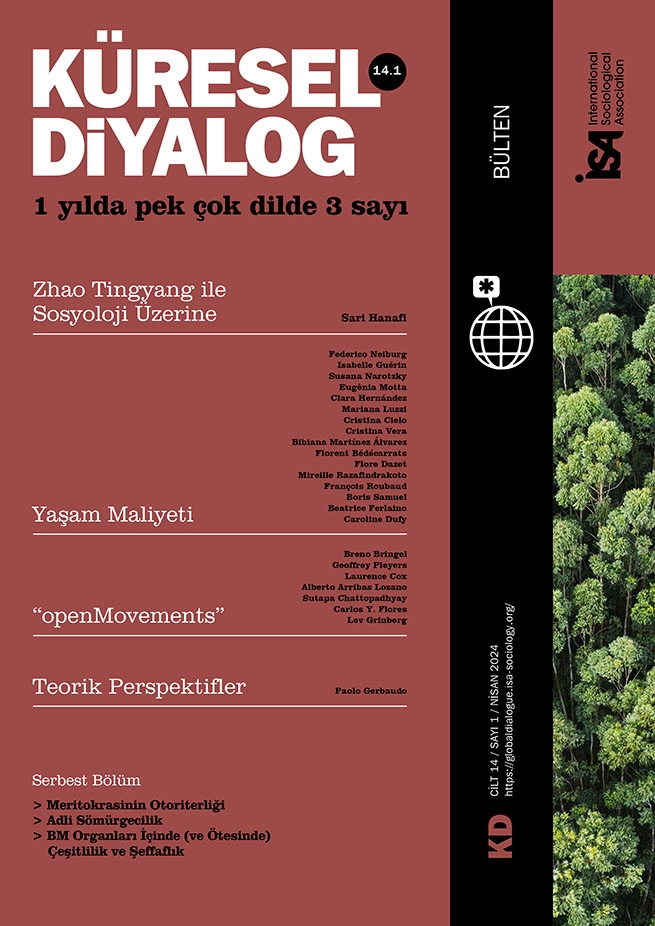Tianxia System and Smart Democracy: An Interview with Zhao Tingyang
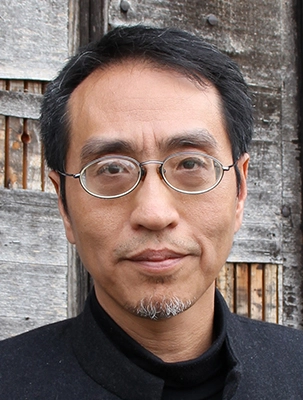
February 29, 2024
Zhao Tingyang is a distinguished Chinese philosopher and leading intellectual who graduated from Renmin University and the Chinese Academy of Social Sciences (CASS). He is an Academician Fellow and Distinguished Professor at CASS Institute of Philosophy and has also held posts at several other Chinese and foreign institutions, including Zhejiang Normal University, the Berggruen Institute and the Institut International TRANSCULTURA. His numerous publications in Chinese, English and other languages include his book All under Heaven: The Tianxia System for a Possible World Order (2021, University of California Press) and his co-edited book Transcultural Dictionary of Misunderstandings: European and Chinese Horizons (2022, Cent mille milliards). He was interviewed in August 2023 by Sari Hanafi, a Professor of Sociology at the American University of Beirut, Lebanon, and past president of the International Sociological Association.
Sari Hanafi (SH): Prof. Zhao, I had the pleasure of reading your last book, All under Heaven: The Tianxia System for a Possible World Order, in which you are critical of the current multiplication of political conflicts worldwide and the current nation-statist logic of international relations. You propose instead the idea of Tianxia, a Chinese word that means ‘all under heaven’, being interdependent, and ensuring the primacy of the world over nation-states. How would you summarize Tianxia in a few words?
Zhao Tingyang (ZT): Let me say my imagination of the Tianxia system of the world envisions a better possible world with the concept of “compatibility”, more popularly translated as “harmony”. I think compatibility is a better translation, in a similar way as Leibniz explains the “best of all possible worlds” made by God with the concept of the “compossibility” of the richest collection of beings. Interestingly, his ontology is really close to the ontology of I Ching, the Chinese bible, which emphasizes the “compatibility” of all beings. A conceptual Tianxia system of “all under heaven” should envision an all-inclusive world of “no outside” with “great harmony” of all peoples or “compatibility” of all civilizations. It is an open question why China began its politics with a concept of a systematic world like Tianxia while Greece had a state as polis: the two most significant starting points of politics.
More than a world system, Tianxia suggests an alternative concept of the political, as a methodology or the art of changing hostility into hospitality, instead of Carl Schmitt’s recognition of the enemy, Marxists’ class struggle, Morgenthau’s struggle for power, or Huntington’s clash of civilizations. The reason is simple: if politics cannot stop or at least reduce hostility, it is no politics at all, nothing more than war of a kind. And war proves the failure of politics rather than being the continuation of politics, as Carl Von Clausewitz thinks. If we want fights, why the political?
More reasonable and practical than the traditional one, my renewed conception of Tianxia claims three constitutional concepts: (1) internalization of the world, a shared universal system inclusive of all nations, so making a world with no more negative externalities; (2) relational rationality, which emphasizes the priority of mutual minimization of hostility above maximization of exclusive interest; and (3) Confucian improvement, which is non-exclusive improvement for everyone, better than Pareto’s improvement, and defined by one improves if-and-only-if all others improve. Confucian improvement means everyone gets Pareto’s improvement if anyone gets it. Hopefully, a new Tianxia will solve global problems such as technological risks, global financial problems, climate change, pandemics and clashes of civilizations.
Consistent with the Tianxia system, global ethics should be based upon an improved “Golden Rule” that is more coherent than Christianity or Confucianism. The traditional Golden Rule says: “Never do to others what you would not like others to do to you.” This is nearly perfect except for its unilateral subjectivity, which problematically implies that the “I” has the one-sided authority to decide the universal concepts of what is good or right. I would rewrite the Golden Rule as “Never do to others what others would not like you to do to them”. By changing subjectivity into trans-subjectivity this new rule becomes strictly reciprocal and symmetric, thus genuinely universal.
A new Tianxia system should also be realized in the epistemological sphere. It envisions a concept of a new encyclopedia, inspired by the French project of encyclopedia in the eighteenth century, and now likely to be supported by the Internet and AI. This involves a concept of knowledge rather than a physical book and is intended to include all knowledge from all civilizations with equal respect and reciprocal recognition. The new encyclopedia will develop upon and from research on universal concerns, or the problems facing all humans, or the “emergences” of interactions, as understood in holism or methodologies of complexity instead of the traditional disciplined taxonomy and reductionist view of knowledge, and in place of the one-sided agenda by Western knowledge, such that it becomes a “metaverse library” for all people.
SH: How do you assess China today in terms of the Tianxia paradigm? In one of your interviews, you said that Communism defeated and excluded its Western competitors in China but also devalued the Chinese culture. The existence of China matters more than its identity; in other words, the fact of being is more important than what something looks like. Can you elaborate on this idea with concrete examples?
ZT: Tianxia is a concept for the whole world. It awaits a possible future in its own time. However, it has interestingly been applied to China, to see it as a “world-pattern state”, smaller than the entire world and therefore far from the best of its conceptual potential; so, I am not sure if China could be considered a Tianxia paradigm. Nevertheless, it can be seen as an example. The “world-patterned China” is of great importance in its invention of the regime of “one country, many systems”, started during the Han Dynasty (202 BCE–220 BCE), under the principle of the priority of compatibility, or harmony if you will, successfully reducing conflict among various cultures or religions. This is part of the living heritage in modern China.
It should not be a big surprise that modern-day China devalues traditional aspects of China because contemporary China has been so eager to become modern. Modernization has been considered a matter of survival for a nation under pressure from the rest of the world. Chinese thinking always follows the principle “Survive all changes” or “Live through change”. This is neither religious faith nor an ethical value; but an “ontological” methodology of existence can nonetheless be found. Of course, China has its cultural or traditional identities to maintain, which are less influential than its mere existence when at a critical point of survival, or its kairos to become better. China is in the “doing” rather than merely “being”, and its methodology matters more than its conceptualization. China loves to improvise since it recognized I Ching, the Book of Changes, as its methodological “bible” in its earliest days. We have here a methodology searching for the optimal chance to survive, exist, persist, and grow strong if possible. Confucianism, as the stereotypical image of China, is less robust than is usually thought. It has experienced its ups and downs throughout history and is contingent on its historicity. I am hesitant to say China remains a Confucian society now. But I am sure the Chinese methodology of “being with changes” remains strong, living longer than any specific value, doctrine, or “ism”.
For instance, this idea can explain the confusing spectacle of “Chinese religions”. From a monotheist perspective, China is a country of no religion. From an anthropological perspective, it is a place of all faiths, or pantheism of a kind; or polytheism as it appears. Specifically, in folk societies and most areas (except the Muslim area), people do not hate the gods of others. On the contrary, most people would rather accept the stories of other gods as well as their own, and even believe in them or at least respect them. So many people have a long list of gods, usually from Buddhism, Taoism, Christianity, along with many local gods. For intellectuals who do not take religions seriously, there is instead a variety of “isms”, the left or the right, the progressive or the conservative. I do not see much faith or loyalty in their choices; most of them will turn to the one which works better.
SH: You have thoroughly diagnosed the crisis of the liberal democracy system and how powerful forces that control capital and the media are subverting democracy, a sort of “Trojan horse” that has destroyed democracy in such a way that the threat to democracy comes from within itself. Can you elaborate?
ZT: A weak point of democracy is its ambiguous conceptualization: never exclusively defined and thus open to interpretations. This vague physiognomy allows everything to disguise itself as democracy and thereby claim its justification; and so, many democratic “Trojan horses” arise. And the worst thing is that it is hard to tell them from true democracy, due to their similarity in appearance and practice. It is not certain that there is a true democracy, for we have never seen the ideal concept or an eidos of democracy, even though we know democracy has its own specific origin and genes. Now, the worst of all: pseudo-democracy is found to be a true twin of democracy, with the same gene. The agora, where democracy was developed, was also a market. A market of opinions is close to a market of commodities; if more people choose apples, then clearly apples are more welcome.
Similarly, if more voters support Trump, then Trump seems justified. Many will not recognize this, but it is awkward due to the lack of a robust democratic reasoning. Market and democracy share the same basic rules. Unfortunately, the majority principle does not always speak truth or goodness; and more unfortunately, there are many ways and opportunities for the political, financial, and media powers to mislead and manipulate people’s choices. Powers are smart; they know the best strategies. In the modern condition of the rule of law as well as under the rule of the market, more powers develop the strategy of reshaping or remaking the public’s mind by selling illusions to the people and thereby creating one common mind. So, we see “publicracy” rather than democracy; or publicracy in the appearance of democracy; or distorted democracy overlaid upon publicracy. That is the “Trojan horse” that undermines democracy.
It is not strange that democracy fails to protect itself from publicracy, because democracy could not recognize the Trojan horse of publicracy: democracy and publicracy look too much alike. The problem is that the existing democracy is unintelligent, whereas the powers underlying publicracy are much smarter. Democracy is a practical way to make public choices, and it has no mind of itself, so it cannot defend itself against outside powers. Fundamentally, democracy does not define what is good or justify what is right; it has never even justified itself. Democracy persists because there is no better alternative. In other words, democracy is a way to decide on the distribution of rights and power, but not the definition of goodness, truth, or justice. Therefore, democracy needs its own mind.
SH: Do you envision any alternative?
ZT: My expectation is for a “smart democracy”, a knowledge-based democracy, hopefully, to become as smart as the powers that try to control it, at least better than the aggregation of misled public opinion.
Let me explain. The smart democracy consists of a “two-vote system” and “two-level elections”. Two votes mean “one person, two votes”, the pro and the con, for any election, representing one’s like and dislike. This “dislike” is an indispensable variable, it even matters more than the “like”, so the “two votes” form a complete representation of one’s mind, better than the prevalent system of “one person, one vote”. The basic rules for the two-vote system are as follows: (1) the net pros rule. That is, net pros = pros − cons. Suppose that A gets 51% pros and 31% cons, then 51% − 31% = 20% net pros; B receives 41% pros and 11% cons, so 41% − 11% = 30% net pros. B should be considered the winner; (2) the conditional majority rule. If A and B coincide in their net pros, the one with more pros wins.
The two-level election means two steps to finish the voting. Firstly, everyone votes for what they want. Secondly, the scientific committee casts the knowledge weighted votes to approve or disapprove people’s choices. So, the two-level election defines the separated powers: people decide what is desirable, and the scientific committee decides what is feasible. If designed this way, democracy could be made institutionally intelligent so that it is smart in itself and, by itself: free from irrational choices. In short, it will be a knowledge-based democracy. My effort is limited to improving the voting system for now. A smart democracy certainly needs more intelligence and smarter conceptions. This is a task to be pursued further.
SH: You call for “knowledge-based democracy”, but who nominates the experts who will be part of commissions or committees? It looks as if “experts” were only providing scientific solutions, but they are often divided along political lines.
ZT: Nomination is always a problem. I am afraid there is no perfect solution. Politics based upon parties is necessarily partisan. The practically feasible way we have might not be the best, but the ideal does not exist, so we have to come to terms with reality. This is why I should confine my imagination to acceptable improvements rather than radical reformation of democracy. But, how will we nominate the experts for the scientific committees to run smart democracy? My idea adopts the traditional “reputation”, referring to well-recognized candidates. One’s reputation is an obvious social fact. For instance, those who are the leading scientists, who have won significant prizes and therefore supposedly know more about the potentiality or risk of what people want to do. Of course, reputation might be misplaced, but knowledge is certainly better than ignorance. The experts will have their political inclinations, and the best thing we could expect is that they would be honest. There are ways to cut off secret financial links.
My theory of smart democracy, as you see, is a modest combination model of mixed “political genes”: about 50% from modern democracy, 30% from Jizi’s optimal decision for public affairs, and 20% from the Plato’s “philosopher king”. I try to balance the wiser traditions of dealing with the public and common affairs. It is about what is more reasonable, still far from ideal.
SH: In reading your work, it seems that your bleak criticism of the democratic system cannot explain why we have social movements today. The democratic system is not a closed one; even with its “Trojan horse”, it is capable of producing (ecological, socio-economic and political) alternatives.
ZT: I fully agree with you that democracy is not a closed concept. Alternatives to institutional democracy, social movements, could be regarded as spontaneous democracy, though supported or curated by some organizations. They are not the “Trojan horses”; I respect them. I guess you would say that social movements are the better side of democracy. To be sure, social movements are closer to direct democracy. This is good. Still, a practical problem in my view is that the pursuit of social movements could also be misled with an unreasonable passion, so that asking for more than a state or the world could afford is occasionally destructive rather than constructive. It reminds me of an old saying: “A housewife knows the expenses of running a family”. I would instead insist on a democracy based upon rational knowledge and institutionally arranged to be smarter by itself. The “cool democracy” is more prudent and reliable than the hotter variety. My question for you is: If we want changes in our societies, how do we know which changes are better for a society?
In most cases, democracy might be blind to what is good. It is funny, or not so funny, that our philosophers still have no clear concept of what “good” is. Democracy itself is not a value today. It is, instead, a matter to be valued.
SH: You question democracy as a value; but what constitutes the value is the qualifier of democracy. This is why we talk today about liberal democracy. I grew up in Syria where the Baath leading party uses “popular” to qualify democracy. When you associate liberalism with democracy, it means freedom of religion, speech, press, and assembly, establishing associations and political parties, and accepting the Universal Declaration of Human Rights in an abstract (and not concrete) way. Should we criticize these values? In “popular” democracy in Syria, there was barely any freedom of expression or the possibility of establishing associations and political parties unless you accepted the ideology of the ruling elites. In addition, the voting system for parliament was complex, with special seats reserved for the working class and peasants, which, for me, is a good thing even if these two categories are not free to organize themselves. Thus, the word “popular” is full of anti-liberal values, but seeks some sense of social justice. This is why we cannot discuss democracy without its qualifier. You use the qualifier “smart” for democracy to move from its current “opinion-based” form to a new “knowledge-based” form. However, how does smartness position itself vis-à-vis the two (popular and liberal) traditions?
ZT: Thanks for your sharp inquiry; it hits home. Before discussing how “smart” democracy could be, I would say there is no pure democracy, making true democracy a problematic concept. You are right: a democracy is related to some values when it is connected to a qualifier. This indicates that democracy itself, the very concept, is nothing more than a tool or procedure and that we will not agree on a democracy committed to values that are not our own. Therefore, qualifiers matter more than democracy, for qualifiers reveal the more profound problems and the conflicts. The highfalutin voice of democracy may conceal the de facto pursuit of specific values, interests, and power.
Your concept of a qualifier is illuminating; it reminds me of the critical problem of ranking values. Everyone has their ranking of values; otherwise, they are trapped in a dilemma of trying to do everything. The ranking of values suggests discrimination and, therefore, conflicts everywhere. Discrimination is a scary word, but it refers to the fact that everyone is discriminating, even though most people would rather take a stand against any discrimination. A qualifier or a partial label of democracy, liberal or popular, individual freedom or social justice, is unlikely to reduce conflicts or disagreements and may even increase social entropy or social fragmentations. So I would rely on something other than the claimed values, no matter how appealing they are. I would instead turn to developing the “settings of intelligence” in the operating system of democracy, in expectation of an intelligence-embedded democracy – what I call “smart democracy” – in which the systematic arrangement will let knowledge take power to make the final decision. In a visionary sense, super AI may help in the future, working as the add-on to human minds or even working together with human minds and finally creating AI-human trans-subjectivity, hopefully smarter and less ideological. Democracy is meant to make public choices in service of a whole society rather than in service of competing political powers.
SH: One last question, which may be of great interest to our readers. Recently, you co-edited the Euro-Chinese Dictionary of Cultural Misunderstandings with European scholars. This idea is terrific because you are outside the postcolonial paradigm where you must look at different (Southern) epistemes but work with your European colleagues to overcome misunderstanding. This is like the Sino-Franco research groups calling for post-Western sociology and working together.
ZT: We need to develop a new and better episteme rather than indulge in the antagonist competition of the traditional ones. I do not take the postcolonial view as a way out of colonialism, or more specifically, orientalism. Our minds will be limited, trapped and misled by colonialist concepts and patterns when we try a postcolonial way of talking back or “unsaying” what has been said of us: the orientalist picture imposed on “us” by colonialists. I mean that if I talk back against colonialism, my mind’s architecture will be constructed by colonial concepts, it will be set in colonial discourses and my words will not speak my own mind. Or, if you say, “I am not as you think”, your scope and sight have been involuntarily confined by the colonialist or orientalist horizons, losing your freedom of mind. The antagonism of epistemes is dull and negative. I would instead restart with the primary and general problems facing all humans, and we may share and exchange different concepts, better arguments, or interesting mutual misunderstandings; all of us may benefit. I call this “transcultural multiplication” – an initial metaphor before I could find a better one.
It is natural for anyone to misunderstand others; the other mind always has a reason to misunderstand us. We may reduce mutual misunderstandings by clarifying basic concepts, seeing if our or their theories and the presuppositions underlying our or their concepts are consistent or not.

